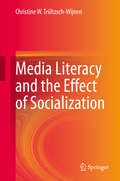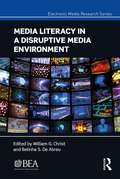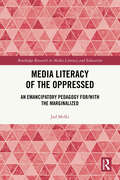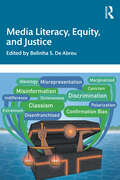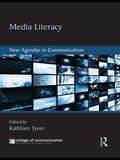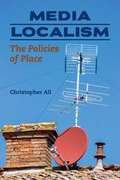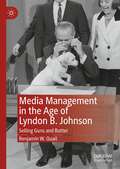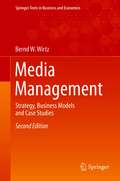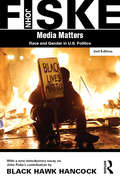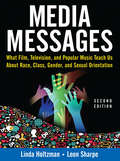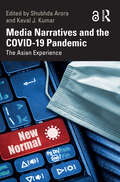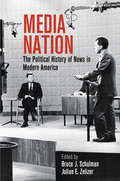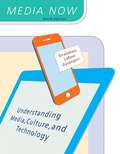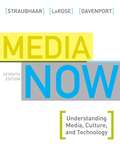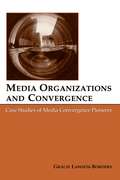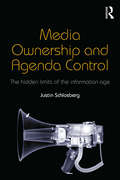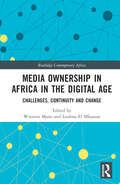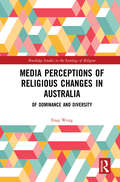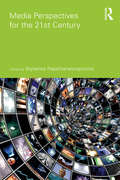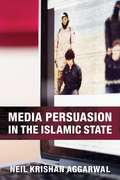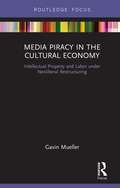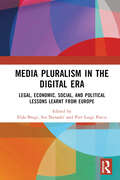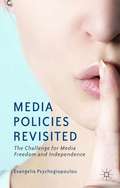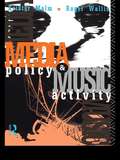- Table View
- List View
Media Literacy and the Effect of Socialization
by Christine W. Trültzsch-WijnenThis book explores the socially and individually determined nature of media literacy, addressing the central question of how individuals’ media activity can be explained and evaluated. It examines people's media activity through the relationship between their competence to act and actual actions. Further, the book discusses the social factors that foster self-determined media activity, including people's abilities and skills and the associated knowledge that facilitates such skills, from the perspectives of various social science disciplines. Lastly, it applies these theoretical reflections to two empirical studies. Overall, this book provides a fundamental introduction to theories of media socialization, media literacy and media competence, and to the relation between media and socialization. It analyses international discourses on children, media, media literacy, and digital literacy. This book is of interest to scholars and researchers in the field of media studies, including media sociology and media education, communication, and cultural studies.
Media Literacy in a Disruptive Media Environment (Electronic Media Research Series)
by Belinha S. De Abreu William G. ChristThis book, part of the BEA Electronic Media Research Series, brings together top scholars researching media literacy and lays out the current state of the field in areas such as propaganda, news, participatory culture, representation, education, social/environmental justice, and civic engagement. The field of media literacy continues to undergo changes and challenges as audiences are reconceptualized and reconfigured, media industries are transformed and replaced, and the production of media texts is available to anyone with a smartphone. The book provides an overview of these. It offers readers specific examples and recommendations to help others as they develop their own teaching and research agendas. Media Literacy in a Disruptive Media Environment will be of great interest to scholars and graduate students studying media literacy through the lens of broadcasting, communication studies, media and cultural studies, film, and digital media studies.
Media Literacy of the Oppressed: An Emancipatory Pedagogy for/with the Marginalized (Routledge Research in Media Literacy and Education)
by Jad MelkiThis book offers an alternative approach to developing media literacy pedagogies for marginalized communities and people in postcolonial countries, especially in the Global South, tackling unexplored issues such as media literacy of war, terrorism, pandemics, infodemics, populism, colonialism, genocide, and intersectional feminism.With an emphasis on developing critical and emotive consciousness — or unveiling the oppressor within — the book provides a unique perspective that fits the needs of people at the margins and challenges mainstream media literacy approaches that are mainly designed for the center and the Global North. The book offers a framework for designing curricula at and with the margins through an emancipatory media literacy approach. This approach directs energy toward resistance and praxis, focuses on local priorities of the margins, contextualizes issues within a postcolonial historical moment, and concentrates on fighting oppression structures and social injustice.This book will be an important resource for scholars, educators, and students of media literacy, communication, cultural studies, critical pedagogy, health communication, postcolonialism, Arab studies, feminism, and human rights.
Media Literacy, Equity, and Justice
by Belinha S. De AbreuOffering a new and thought-provoking look at media literacy education, this book brings together a range of perspectives that address the past, present, and future of media literacy, equity and justice. Straddling media studies, literacy education, and social justice education, this book comes at a time when the media’s role as well as our media intake and perceptions are being disrupted. As a result, questions of censorship, free speech, accountability abound, and nuance is often lost. This book is an antidote to the challenges facing media literacy education: chapters offer a careful examination of important and hot topics, including AI, authenticity, representation, climate change, activism and more. Addressing the continually evolving role of media and its impact on our society and shared knowledge base, the volume is organized around five themes: Misinformation and Disinformation; Media Representation; Civic Media, Politics and Policy; Eco Media Literacy; Education and Equity, Ethical Quandaries and Ideologies; and Emerging Technologies. Ideal for courses on media literacy and new literacies, this book furthers the conversation on the ways literacy and social justice are connected to educational communities in local and global contexts.
Media Literacy: New Agendas in Communication (New Agendas in Communication Series)
by Kathleen TynerThis volume explores how educators can leverage student proficiency with new literacies for learning in formal and informal educational environments. It also investigates critical literacy practices that can best respond to the proliferation of new media in society. What sorts of media education are needed to deal with the rapid influx of intellectual and communication resources and how are media professionals, educational theorists, and literacy scholars helping youth understand the possibilities inherent in such an era? Offering contributions from scholars on the forefront of media literacy scholarhip, this volume provides valuable insights into the issues of literacy and the new forms of digital communication now being utilized in schools. It is required reading for media literacy scholars and students in communication, education, and media.
Media Localism: The Policies of Place (The History of Communication)
by Christopher AliWe live in a boosterish era that exhorts us to play local and buy local. But what does it mean to support local media? How should we define local media in the first place? Christopher Ali delves into our ideas about localism and their far-reaching repercussions for the discourse of federal media policy and regulation. His critique focuses on the new interest in localism among regulators in the United States, the United Kingdom, and Canada. As he shows, the many different and often contradictory meanings of localism complicate efforts to study local voices. At the same time, market factors and regulators' unwillingness to critically examine local media blunt challenges to the status quo. Ali argues that reconciling the places where we live with the spaces we inhabit will point regulators toward effective policies that strengthens local media. That new approach will again elevate local media to its rightful place as a vital part of the public good.
Media Management in the Age of Lyndon B. Johnson: Selling Guns and Butter
by Benjamin W. QuailThis book looks broadly at how the contentious relationships between the media and US President Lyndon B. Johnson affected the national consciousness during the turbulent period of his leadership. Johnson had to deal with a particularly difficult and divisive period in American history and his relationship with the press undoubtedly contributed to an atmosphere of friction within the United States. A more specific purpose of this research monograph is ultimately to shine a light on the trials and tribulations that Johnson faced as a president dealing with new forms of communication in the 1960s. It aims to show the difficulties that he had in adapting a very personal style of leadership – which had served him well in the Senate – in the role he undertook as leader of a nation. Further to this, it builds on this foundation to argue that Johnson developed a reactive, passive stance to dealing with the media, one that ultimately contributed to a loss in popularity and status as leader – a blow he never recovered from during his time in office.
Media Management: Strategy, Business Models and Case Studies (Springer Texts in Business and Economics)
by Bernd W. Wirtz“Digitalization significantly changes the media. To cope with this change and to exploit new market opportunities is a major challenge for media corporations. Bernd Wirtz provides a valuable guideline for this new world, combining theory, facts, and practice.” Dr. Hubert Burda, German publisher and Managing Corporate Partner of Hubert Burda Media Holding KG “The media business is subject to substantial change while differences between distinctive media areas are fading away. This is due to technical innovation in areas like transmittance of content, bearer of content and recording devices but also due to new formats, trends and constant change of consumer behavior.” The textbook “Media and Internet Management” stays abreast of changes and covers this topic on a well-founded and comprehensive basis. It makes a valuable contribution to theory and practice in media management and is highly recommendable to media managers.” Christoph Mohn, Chairman of the Supervisory Board, Bertelsmann AG “The world of media is full of challenges and dynamic conditions for its field. The dynamic of this market is accelerated even more by new digital technologies and ongoing globalization. This book is an absolute “must have” for everyone who wants to know more about the basics, conditions and requirements of modern media management. The analytical clearness and structure make this publication highly relevant for students, but also for managers.” Urs Rohner, Chairman of the Board of Directors, Credit Suisse Group AG “Media Management is a textbook, but a very welcome newcomer for students and teachers as it fills a market gap for good educational material in this rapidly evolving field. It is concise, simple (but not simplistic), and contains a contemporary overview of concepts and tools for media managers. ” Prof. Dr. Bozena I. Mierzejewska, Editor of The International Journal on Media Management, Fordham University, New York “Summed up, with his second edition Wirtz managed to strengthen the outstanding position of his publication “Media Management”. His textbook shines because of its content, analytical clearness and the high relevance for business practice without losing its academic background. With the second edition this book has established its position in the field of media business as the leading standard reference book in Germany. It is suitable for business students, lectures as well as managers who can gain magnificent information from it.” Prof. Dr. Wolfgang Fritz, Director of the Institute of Marketing, Braunschweig University of Technology, Germany; Honorary Professor at the Institute of Business Administration, University of Vienna, Austria.
Media Matters: Race & Gender in U.S. Politics
by John Fiske Black Hawk HancockNow, more than 20 years since its initial release, John Fiske’s classic text Media Matters remains both timely and insightful as an empirically rich examination of how the fierce battle over cultural meaning is negotiated in American popular culture. Media Matters takes us to the heart of social inequality and the call for social justice by interrogating some of the most important issues of its time. Fiske offers a practical guide to learning how to interpret the ways that media events shape the social landscape, to contest official and taken-for-granted accounts of how events are presented/conveyed through media, and to affect social change by putting intellectual labor to public use. A new introductory essay by former Fiske student Black Hawk Hancock entitled ‘Learning How to Fiske: Theorizing Cultural Literacy, Counter-History, and the Politics of Media Events in the 21st Century’ explains the theoretical and methodological tools with which Fiske approaches cultural analysis, highlighting the lessons today’s students can continue to draw upon in order to understand society today.
Media Messages: What Film, Television, and Popular Music Teach Us About Race, Class, Gender, and Sexual Orientation
by Linda Holtzman Leon SharpeThe new edition of this widely adopted book reveals how the popular media contribute to widespread myths and misunderstanding about cultural diversity. While focused on the impact of television, feature film, and popular music, the authors reach far beyond media to explore how our understanding, values, and beliefs about race, class, gender and sexual orientation are constructed. They analyze how personal histories, combined with the collective history of oppression and liberation, contribute to stereotypes and misinformation, as well as how personal engagement with media can impact prospects for individual and social freedom. Along with updated media examples, expanded theories and analysis, this edition explores even more deeply the coverage of race in two chapters, discusses more broadly how men and boys are depicted in the media and socialized, and how class issues have become even more visible since the Great Recession of the 21st century and the Occupy movements. Special activities and exercises are provided in the book and an online Instructor's Manual is available to adopters.
Media Narratives and the COVID-19 Pandemic: The Asian Experience
by Shubhda Arora Keval J. KumarThis volume investigates mediated lives and media narratives during the Covid-19 pandemic, with Asia as a focus point. It shows how the pandemic has created an unprecedented situation in this globalized world marked by many disruptions in the social, economic, political, and cultural lives of individuals and communities— creating a ‘new normal’. It explores the different media vocabularies of fear, panic, social distancing, and contagion from across Asian nations. It focuses on the role media played as most nations faced lockdowns and unique challenges during the crisis. From healthcare workers to sex workers, from racism to nationalism, from the plight of migrant workers in news reporting to state propaganda, this book brings critical questions confronting media professionals into focus. The volume is of critical interest to scholars and researchers of media and communication studies, politics, especially political communication, social and public policy, and Asian studies.
Media Narratives and the COVID-19 Pandemic: The Asian Experience
by Shubhda Arora Keval J. KumarThis volume investigates mediated lives and media narratives during the Covid-19 pandemic, with Asia as a focus point. It shows how the pandemic has created an unprecedented situation in this globalized world marked by many disruptions in the social, economic, political, and cultural lives of individuals and communities— creating a ‘new normal’. It explores the different media vocabularies of fear, panic, social distancing, and contagion from across Asian nations. It focuses on the role media played as most nations faced lockdowns and unique challenges during the crisis. From healthcare workers to sex workers, from racism to nationalism, from the plight of migrant workers in news reporting to state propaganda, this book brings critical questions confronting media professionals into focus.The volume is of critical interest to scholars and researchers of media and communication studies, politics, especially political communication, social and public policy, and Asian studies.
Media Nation: The Political History of News in Modern America (Politics and Culture in Modern America)
by Bruce J. Schulman Julian E. ZelizerFrom the creation of newspapers with national reach in the late nineteenth century to the lightning-fast dispatches and debates of today's Internet, the media have played an enormous role in modern American politics. Scholars of political history universally concede the importance of this relationship yet have devoted scant attention to its development during the past century. Even as mass media have largely replaced party organizations as the main vehicles through which politicians communicate with and mobilize citizens, little historical scholarship traces the institutional changes, political organizations, and media structures that underlay this momentous shift.With Media Nation, editors Bruce J. Schulman and Julian E. Zelizer seek to bring the media back to the center of scholarship on the history of the United States since the Progressive Era. The book's revealing case studies examine key moments and questions within the evolution of the media from the early days of print news through the era of television and the Internet, including battles over press freedom in the early twentieth century, the social and cultural history of news reporters at the height of the Cold War, and the U.S. government's abandonment of the Fairness Doctrine and the consequent impact on news production, among others.Although they cover a diverse array of subjects, the book's contributors cohere around several critical ideas, including how elites interact with media, how key policy changes shaped media, and how media institutions play an important role in shaping society's power structure. Highlighting some of the most exciting voices in media and political history, Media Nation is a field-shaping volume that offers fresh perspectives on the role of mass media in the evolution of modern American politics.Contributors: Kathryn Cramer Brownell, David Greenberg, Julia Guarneri, Nicole Hemmer, Richard R. John, Sam Lebovic, Kevin Lerner, Kathryn J. McGarr, Matthew Pressman, Emilie Raymond, Michael Schudson, Bruce J. Schulman, Julian E. Zelizer.
Media Now: Understanding Media, Culture, And Technology (Mindtap Course List Series)
by Joseph Straubhaar Lucinda Davenport Robert LaRoseOffering the most current coverage available, MEDIA NOW: UNDERSTANDING MEDIA, CULTURE, AND TECHNOLOGY, 9e equips readers with a thorough understanding of how media technologies develop, operate, converge, and affect society. The text provides a comprehensive introduction to today's global media environment and ongoing developments in technology, culture, and critical theory that continue to transform the rapidly evolving industry−and impact your daily life. Focusing on the essential history, theories, concepts, and technical knowledge, MEDIA NOW develops readers' media literacy skills to prepare them for work in the expanding fields of the Internet, interactive media, and traditional media industries. In addition to vivid infographics and illustrations, the cutting-edge Ninth Edition includes the latest developments and trends in social media, e-publishing, policy changes for Internet governance, online privacy protection, online ad exchanges, the changing video game industry, and much more.
Media Now: Understanding Media, Culture, and Technology
by Joseph Straubhaar Robert Larose Lucinda DavenportMEDIA NOW, Seventh Edition, empowers you to think critically about the media and its effects on culture by providing a thorough understanding of how media technologies develop, operate, converge, and affect society. MEDIA NOW prepares you for encounters in the expanding fields of the Internet, interactive media, and traditional media industries through engaging, up-to-date material that covers the essential history, theories, concepts, and technical knowledge you need to thrive. Extensively updated in a new sixth edition, MEDIA NOW provides a comprehensive introduction to today's global media environment and ongoing developments in technology, culture, and critical theory that continue to transform this rapidly evolving industry and affect our daily lives.
Media Organizations and Convergence: Case Studies of Media Convergence Pioneers (Routledge Communication Series)
by Gracie L. Lawson-BordersThis volume offers a timely examination of technology's impact on media companies and the results of convergence among media industries, considering the effects on journalistic, business, and economic practices. Media Organizations and Convergence: Case Studies of Media Convergence Pioneers considers the many definitions of convergence and explores the changes in communication technologies. Author Gracie L. Lawson-Borders provides a brief history of media segments and their evolutions as they adapt to emerging technologies, media conglomeration, and the competitive and global changes that have occurred in the industry. She also examines the theoretical implications of technology and convergence in the operations and practices of media organizations.The case studies included here profile three media convergence pioneers--Tribune Company in Chicago, Media General in Richmond, and Belo Corporation in Dallas--that have incorporated convergence into their journalistic practices. Lawson-Borders considers the social, cultural, and political implications of convergence, and presents issues and concerns for the future of convergence in the media industry.As a snapshot of media convergence at the current stage in its evolution, this book offers important insights into the business of media at a time of dramatic change. It will be a valuable resource for scholars and students in media management, mass media, and related areas of the media industry.
Media Ownership and Agenda Control: The hidden limits of the information age (Communication and Society)
by Justin SchlosbergMedia Ownership and Agenda Control offers a detailed examination of media ownership amidst the complexities of the information age, from the resurgence of press barons to the new influence wielded by internet giants. Much of the discussion pivots around recent revelations and controversies in the media industry, such as the findings published in 2012 from the Leveson Inquiry, the US Federal Communications Commission’s ruling on net neutrality in 2015, Edward Snowden’s decision to leak National Security Agency (NSA) documents in 2013 and the legal battles over ancillary copyrights waged in Germany and elsewhere. Justin Schlosberg traces the obscure and often unnoticed ways in which agendas continue to be shaped by a small number of individual and institutional megaphones, despite the rise of grassroots and participatory platforms, and despite ubiquitous displays of adversarial journalism. Above all, it explores the web of connections and interdependence that binds old and new media gatekeepers, and cements them to the surveillance and warfare state. This ultimately foregrounds the book’s call for a radical rethink of ownership regulation, situating the movement for progressive media reform alongside wider struggles against the iniquities and injustices of global capitalism. This book’s re-evaluation of the nature of media ownership and control in a postdigital world will prove to be an invaluable resource for students of media studies and journalism, as well as all those with an interest in the changing dynamics of media power. Get involved: Reclaimthemedia.org
Media Ownership in Africa in the Digital Age: Challenges, Continuity and Change (Routledge Contemporary Africa)
by Winston Mano Loubna El MkaouarWho owns the media and communications in Africa today and with what implications? The book elegantly answers this urgent question by unpacking multiple dimensions of media ownership through rare and authoritative perspectives, including both historical and contemporary digital developments. It traces the evolving forms of ownership of media and communications in specific African contexts, showing how they interact with broader changes in and outside the continent. The book also shows how Big Techs, such as Meta (formerly known as Facebook), are involved in a scramble for Africa’s digital ecosystem and how their advance brings both opportunities and concerns about ownership and control. The chapters analyse evolving forms of ownership and their implications on media concentration and democracy across Africa. The book offers a nuanced account of how media ownership structures are in some instances captured with an ever-growing and complex ecosystem that also has new opportunities for public interest media. Offering a significant representation of the trends and diversity of existing media systems, the book goes beyond the postcolonial geographical divisions of North and Sub-Saharan Africa to highlight common patterns and significant similarities and differences of communications ownerships between and within African countries. The contributors expose media and communications ownership patterns in Africa that are centralised and yet decentralising and in some cases, battling, resurging and globalising.
Media Perceptions of Religious Changes in Australia: Of Dominance and Diversity (Routledge Studies in the Sociology of Religion)
by Enqi WengThis volume explores the contradiction between the news coverage given to issues of religion, particularly since 2001 in relation to issues such as terrorism, politics, security and gender, and the fact of its apparent decline according to Census data. Based on media research in Australia, and offering comparisons with the UK, the author demonstrates that media discussions overlook the diversity that exists within religions, particularly the country’s main religion, Christianity, and presents religion according to specific interpretations shaped by race, class and gender, which in turn result in very limited understandings of religion itself. Drawing on understandings of the sacred as a non-negotiable value present in religious and secular form, Media Perceptions of Religious Changes in Australia calls for a broader sociological perspective on religion and will appeal to scholars of sociology and media studies with interests in religion and public life.
Media Perspectives for the 21st Century (Communication and Society)
by Stylianos PapathanassopoulosMedia Perspectives for the 21st Century brings together key international scholars to explore concepts, topics and issues concerning the communication environment in contemporary democratic societies. It combines qualitative and quantitative approaches to provide an interdisciplinary and truly global perspective that reflects the trends, theories and issues in current media and communication research. The collection raises significant questions about the study of the media by challenging approaches to major media and societal issues, and analyses in more depth the range of concerns that shape both the present and the future media landscape and the issues these can create for communication. It also investigates the main effects of technological developments on the domain of the news media and journalism. Divided into two main sections, Part I provides accounts of the role of the media in society, and deals with agendas that affect the field of communications studies. Part II goes on to examine the world of new media and offers analyses on the developments of the 21st century. Chapters deal with various dimensions of media from a number of different perspectives and socio-political contexts, covering a wide range of topics including Social Networking, Political Communication, Public Journalism, Global Infotainment and Consumer Culture. Media Perspectives for the 21st Century will be highly useful to undergraduate and postgraduate students, as well as researchers and academics, in the fields of media and communication studies, mass communication, journalism and new media.
Media Persuasion in the Islamic State
by Neil Krishan AggarwalSince the declaration of the War on Terror in 2001, militant groups such as al-Qaeda and the Islamic State have used the internet to disseminate their message and persuade people to commit violence. While many books have studied their operational strategies and battlefield tactics, Media Persuasion in the Islamic State is the first to analyze the culture and psychology of militant persuasion.Drawing upon decades of research in cultural psychiatry, cultural psychology, and psychiatric anthropology, Neil Krishan Aggarwal investigates how the Islamic State has convinced people to engage in violence since its founding in 2003. Through analysis of hundreds of articles, speeches, videos, songs, and bureaucratic documents in English and Arabic, the book traces how the jihadist Abu Musab al-Zarqawi created a new culture and psychology, one that would pit Sunni Muslims against all others after the U.S.-led invasion of Iraq. Aggarwal tracks how Osama bin Laden and al-Zarqawi disagreed over the goal of militancy in jihad before reaching a détente in 2004 and how al-Qaeda in Iraq merged with five other groups to diffuse its militant cultural identity in 2006 before taking advantage of the Syrian civil war to emerge as the Islamic State. Aggarwal offers a definitive analysis of how culture is created, debated, and disseminated within militant organizations like the Islamic State. Psychiatrists, psychologists, and area-studies experts will find a comprehensive, systematic method for analyzing culture and psychology so they can partner with political scientists, policy makers, and counterterrorism experts in crafting counter-messaging strategies against militants.
Media Piracy in the Cultural Economy: Intellectual Property and Labor Under Neoliberal Restructuring (Routledge Focus on Digital Media and Culture)
by Gavin MuellerThis book takes a Marxist approach to the study of media piracy – the production, distribution, and consumption of media texts in violation of intellectual property laws – to examine its place as an endemic feature of the cultural economy since the rise of the Internet. The author explores media piracy not in terms of its moral or legal failings, or as the inevitable by-product of digital technologies, but as a symptom of a much larger restructuring of cultural labor in the era of the Internet: labor that is digital, entrepreneurial, informal, and even illegal, and increasingly politicized. Sketching the contours of this new political economy while engaging with theories of digital media, both critical and celebratory, Mueller reveals piracy as a submerged social history of the digital world, and potentially the key to its political reimagining. This significant contribution to the study of piracy and digital culture will be vital reading for scholars and students of critical media studies, cultural studies, political theory, or digital humanities, and particularly those researching media piracy, digital labor, the digital economy, and Marxist theory.
Media Pluralism in the Digital Era: Legal, Economic, Social, and Political Lessons Learnt from Europe
by Elda BrogiBringing together scholars, journalists, and researchers from 27 European countries, this book provides a comparative and longitudinal analysis of the evolution of conditions and standards relevant for sustainable, free, and plural media and journalism in Europe in the last ten years.Approaching the challenging and ever-changing concept of media pluralism from various complementary and sometimes conflicting angles, combining legal, economic, social, and political perspectives, chapters provide a holistic account of the concept of media pluralism, a key condition for a well-functioning democracy. This book draws on data from the Media Pluralism Monitor project, a scientific tool designed and implemented on a regular basis to document the health of media ecosystems, to provide insights into central dimensions of media systems across the EU and candidate countries. These include: the fundamental protection of freedom of expression and safety of journalists and the independence of media authorities; market plurality, transparency of ownership, media concentration, media viability, competition enforcement, and digital platforms’ dominance; disinformation, media literacy, and digital challenges; political independence, conflicts of interest, editorial autonomy, and the independence of public service media; social inclusiveness, including access to media and representation of women and community media. Offering a comprehensive overview of key areas of EU media policy, causes and solutions for the media economic struggle, and innovative examples of business models for journalism in the digital age, this book is recommended reading for advanced students and researchers of media policy and regulation, as well as policymakers.
Media Policies Revisited
by Evangelia PsychogiopoulouEvangelia Psychogiopoulou brings together distinguished scholars across a range of academic disciplines to investigate the media's freedom and independence, and the media policy processes, institutional spaces, regulatory practices and instruments that can support the development of free and independent media in Europe.
Media Policy and Music Activity
by Krister Malm Roger WallisHow do people make music - and how does this activity relate to the policies of governments and the music industry? What is the relationship between live music and music we hear on the radio, or in music videos? How has the digital revolution affected music-making in industrialised and in developing nations? In Media Policy and Music Activity, Krister Malm and Roger Wallis look in depth at the relationships between policies governing the output of the music media and music activity in society. A practical base in case study material is combined with a broad theoretical framework for understanding the music media.
